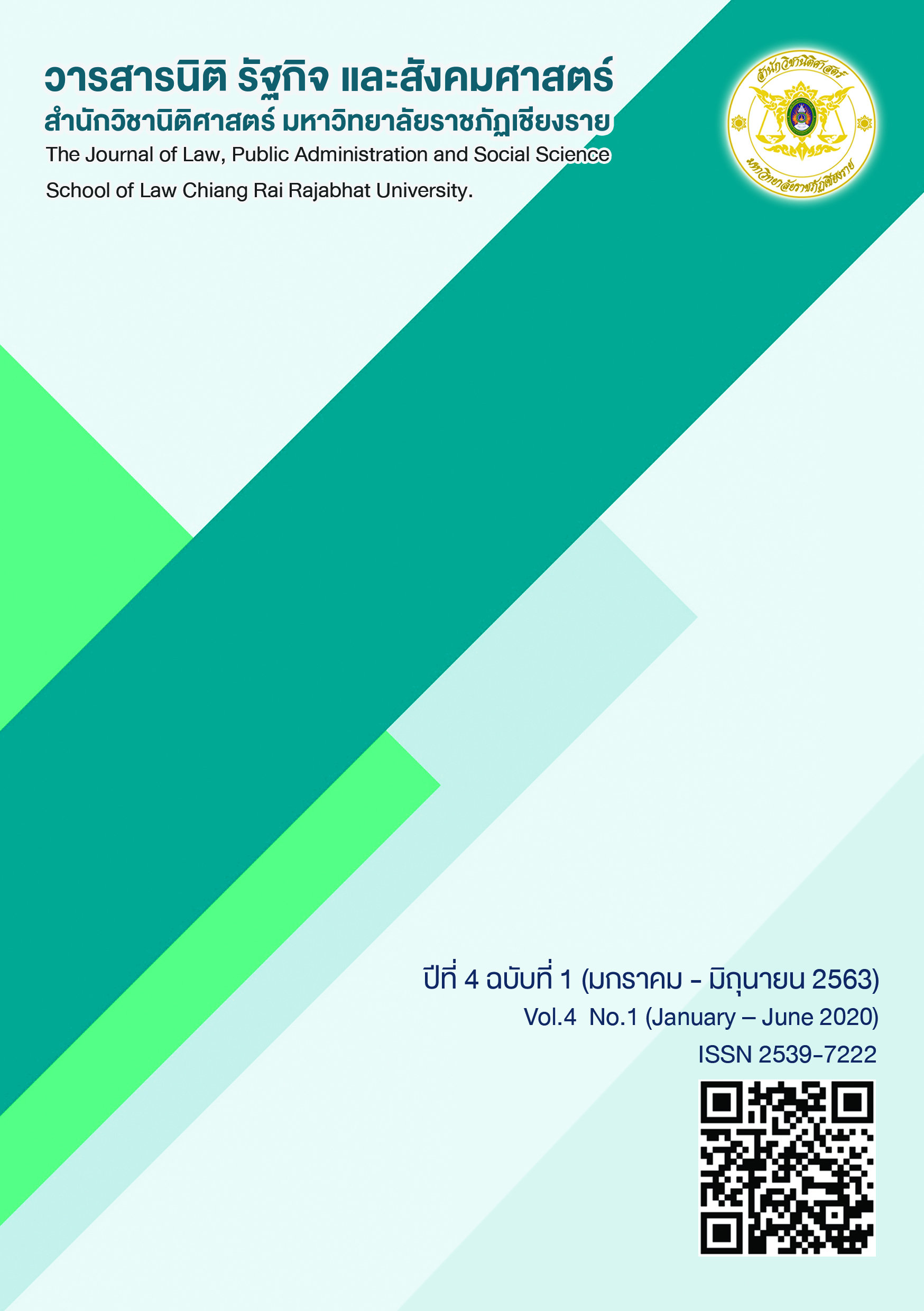The Constitution of the People and Pushes on Popularist Model Supported for Grass Root-Classed Citizens in Thai Society
Main Article Content
Abstract
The1997's constitution of Thailand was called " The Constitution of the people" originated from the demand of political reform after "The Black May". The context of various surrounding condition which happen before and after the declaration of this constitution such as social gaps, economic conditions, the instability of government administration, political crisis with many coups, differences in citizen's education etc. These factors directly affect every classes in Thailand society that was already in inequitable as it is. "Tom-yam-kung crisis" which devastated Thailand economic also play a part in the turmoil in the fringe before the official declaration of people's constitution. The certain occurrences displayed the desperation of every individuals within Thai society.
The Constitution of the people was officially declared in the period of 1997's Tom-yam-kung Crisis and help “ThaiRakThai party” pushed their own populism through "Edible Democracy" slogan. This populism policy helped tremendously increase people's support for “ThairakThai” with the exchange of government aids and the support of grass root class for the party's political stand. This was the opportunity that guaranteed the second terms election of Thairakthai Political Party and created the phenomenon called “parliamentary dictatorship”. The attempt to relief the damages from the time of thairakthai regime was in conform with the realistic approach to populism policy in Thai society. The occurrence analysis could be separated into 5 points, 1) the political crisis which affect the government administration that leads to “black may” political reform 2) The affect of economic crisis in fringe of the declaration of the constitution because of the failure of governance that affects the sustainability of economic that leads to the acceptance of populism policy in grass roots citizens. 3) The transferring of political power through the mechanism of the constitution created "authoritarian parliament" fuels the discontent between the parties without bargaining power in politics and governance. 4) The raised of people's support from practical policy is the reduction of influence of local politicians (as election campaigners in the past) then establish the voting base by the practical policy of the party as a replacement. 5) The different viewpoints of democracy in Thai society. The middle class will vote on the economic development policy but the grassroots will vote for the government that could directly help their citizens.
Article Details
References
กิจบดี ก้องเบญจภุช . (2560). การสืบทอดอำนาจทางการเมืองโดยมิชอบ. วารสารนิติศาสตร์และสังคมท้องถิ่น คณะนิติศาสตร์ มหาวิทยาลัยราชภัฏสุราษฎร์ธานี. 2 (2), 1–2.
เกษียร เตชะพีระ. (2550). จากระบอบทักษิณสู่รัฐประหาร 19 กันยายน 2549: วิกฤตประชาธิปไตยไทย. กรุงเทพมหานคร: มูลนิธิ 14 ตุลา.
ชลิตา สุนันทาภรณ์. (2560). 20 ปีวิกฤติเศรษฐกิจต้มยำกุ้ง: จากต้มยำกุ้งสู่ต้มกบ. สืบค้นวันที่ 22 สิงหาคม 2562, จาก https://waymagazine.org/20-yrs-tyk-crisis_1/
ชาญชัย จิตรเหล่าอาพร. (2561). การทุจริตการเลือกตั้ง: อุปสรรคการพัฒนาประชาธิปไตยของไทย. วารสารรัฐศาสตร์สุโขทัยธรรมาธิราช. 2 (2), 6–8.
ฐานเศรษฐกิจ. (2560). ที่นี่ไม่มีความลับ : 20 ปี “ต้มยำกุ้ง” อดีตสู่อนาคตเศรษฐกิจไทย. สืบค้นวันที่ 22 สิงหาคม 2562, จาก http://www.thansettakij.com/content/172992
ตรีเพชร จินต์นุพงศ์. (2561). เรื่องน่ารู้ผู้ตรวจการแผ่น ผู้ตรวจการแผ่นดินเพื่อธรรมาภิบาล OMBUDSMAN FOR GOOD GOVERNANCE. วารสารผู้ตรวจการแผ่นดิน, 24 (2), 171.
แถมสุข นุ่มนนท์. (2550). สภาร่างรัฐธรรมนูญ : เส้นทางการปฏิรูปการเมืองไทย. กรุงเทพมหานคร: สถาบัน พระปกเกล้า.
ไทยรัฐฉบับพิมพ์. (2560). ถอดบทเรียนวิกฤติต้มยำกุ้ง 20 ปี แห่งการสร้างภูมิคุ้นกันให้เศรษฐกิจไทย. สืบค้นวันที่ 22 สิงหาคม 2562, จาก https://www.thairath.co.th/newspaper/columns/990730
นรนิติ เศรษฐบุตร. (ม.ป.ป.). 11 ตุลาคม พ.ศ. 2540. สืบค้นเมื่อ 20 สิงหาคม 2562, จาก wiki.kpi.ac.th/index.php?title=11_ตุลาคม_พ.ศ._2540
นันทวุฒิ พิพัฒน์เสรีธรรม. (2551). ปัจจัยที่มีผลกระทบต่อการเกิดขึ้นของประชานิยมในประเทศไทย. วารสารเศรษฐศาสตร์ธรรมศาสตร์ . 26 (3), 120-121.
ลิขิต ธีรเวคิน. (2552). ปัญหาทางการเมืองที่ยากแก่การแก้ไขเยียวยา. สืบค้นวันที่ 22 สิงหาคม 2562, จาก https://mgronline.com/daily/detail/9520000071306
ศาสตรินทร์ ตันสุน. (2557). ในความเหมือนและความต่างกระบวนการร่างรัฐธรรมนูญแห่งราชอาณาจักรไทย พุทธศักราช 2540 และรัฐธรรมนูญแห่งราชอาณาจักรไทย พุทธศักราช 2550. วารสารรัฐศาสตร์ปริทรรศ มหาวิทยาลัยเกษตรศาสตร์ . 1 (1), 37–38.
สมชาย ปรีชาศิลปกุล. (2560). 20 ปี รัฐธรรมนูญ 2540 : การปฏิรูปการเมืองไทยในอุ้งมือนักกฎหมายมหาชน. สืบค้นวันที่ 20 สิงหาคม 2562, จาก https://www.the101.world/20-year-constitution-2540/
สุชาติ บำรุงสุข. (2559). เสนาธิปไตย : รัฐประหารกับการเมืองไทย. กรุงเทพมหานคร: สำนักพิมพ์มติชน.
สำนักงานเลขาธิการสภาผู้แทนราษฎร. (2540). รายงานการประชุมสภาร่างรัฐธรรมนูญ ครั้งที่ 1. กรุงเทพมหานคร: สำนักงานเลขาธิการสภาผู้แทนราษฎร.
อนุชา ดีสวัสดิ์. (ม.ป.ป.). สภาร่างรัฐธรรมนูญไทย. กรุงเทพมหานคร: กลุ่มงานห้องสมุด สำนักวิชาการ สำนักงานเลขาธิการสภาผู้แทนราษฎร.
อนันยา พลจันทร์. (2560). ธรรมาภิบาลในการแต่งตั้งโยกย้ายข้าราชการตำรวจ. วารสารวิชาการ มหาวิทยาลัยราชภัฏพระนคร . 8 (1), 2–3.
เอนก เหล่าธรรมทัศน์. (2549). ทักษินา-ประชานิยม. กรุงเทพมหานคร: สำนักพิมพ์มติชน.
เอนก เหล่าธรรมทัศน์. (2552). การวิจัยชนบทสู่การพัฒนานโยบายสาธารณะท้องถิ่น. กรุงเทพมหานคร: บริษัท ที คิว พี จำกัด.
เอนก เหล่าธรรมทัศน์. (2556). สองนคราประชาธิปไตย: แนวทางการปฏิรูปการเมืองเศรษฐกิจ เพื่อประชาธิปไตย. พิมพ์ครั้งที่ 8, กรุงเทพมหานคร: สำนักพิมพ์คบไฟ.
Salaryinvestor. (2561). “ต้มยำกุ้ง” คืออะไร? ถอดบทเรียนวิกฤติเศรษฐกิจครั้งใหญ่ของไทย. สืบค้นวันที่ 22 สิงหาคม 2562, จาก
http://salaryinvestor.com/inspire/case-study/tom-yum-kung-lesson/


